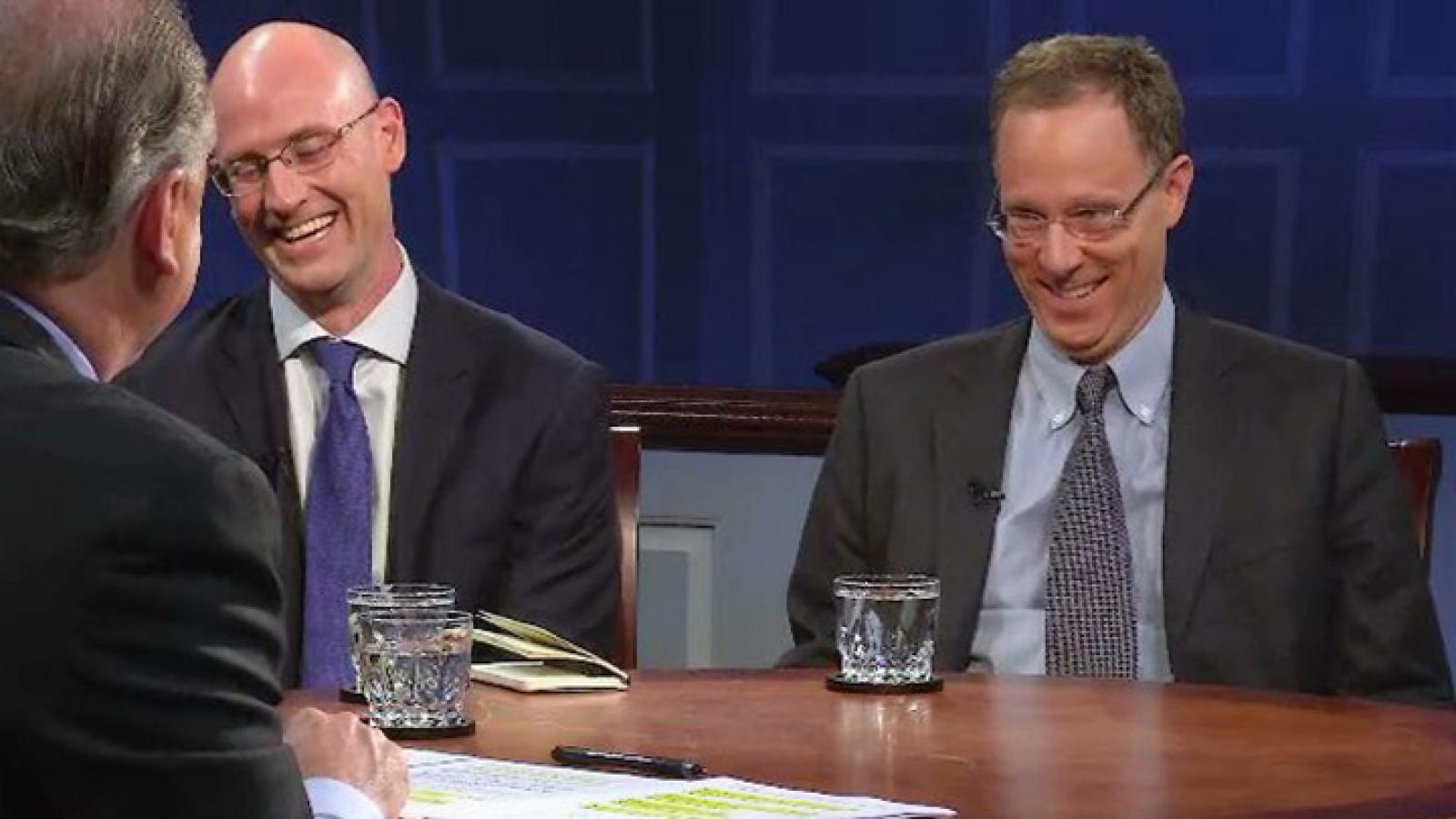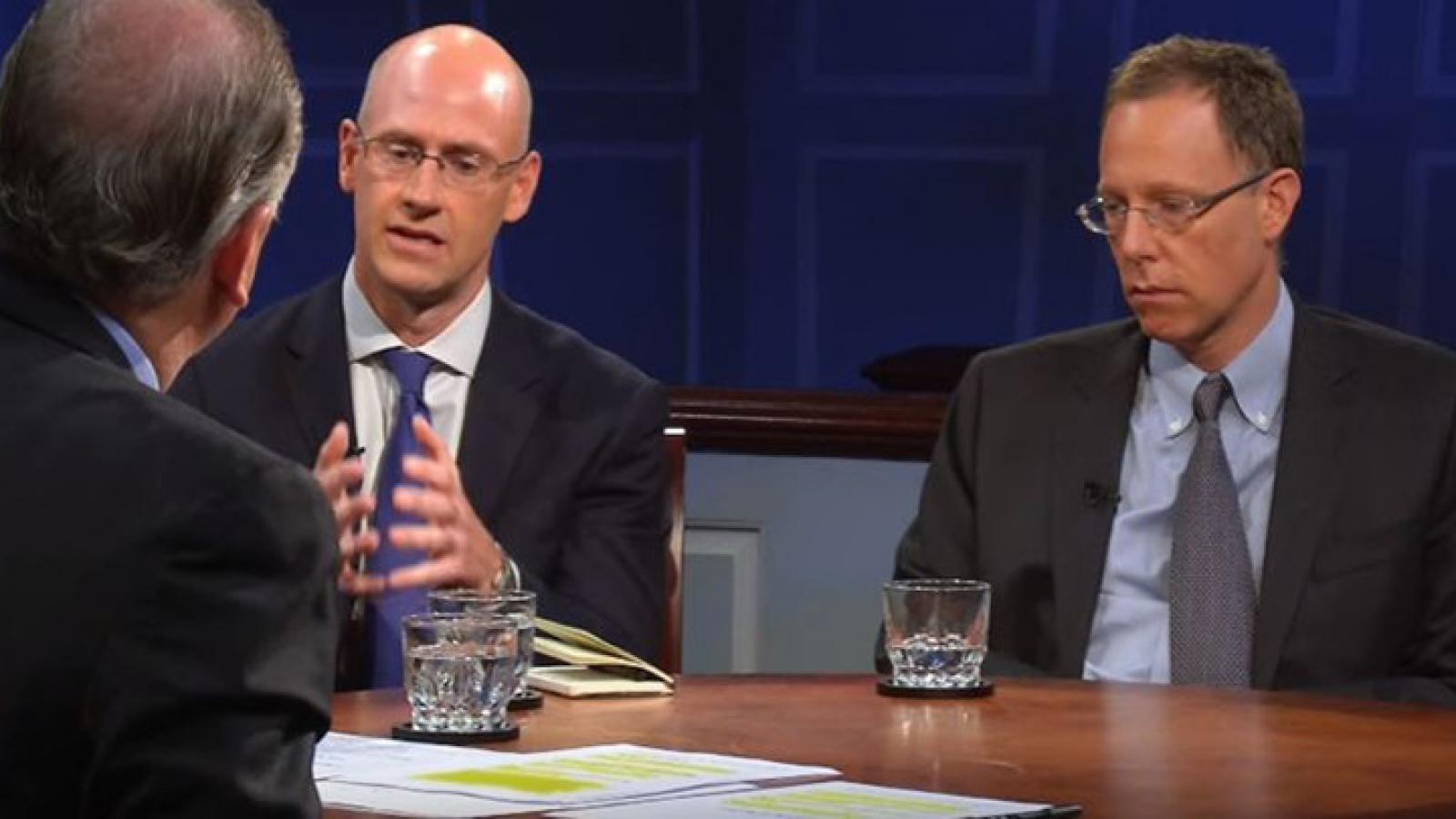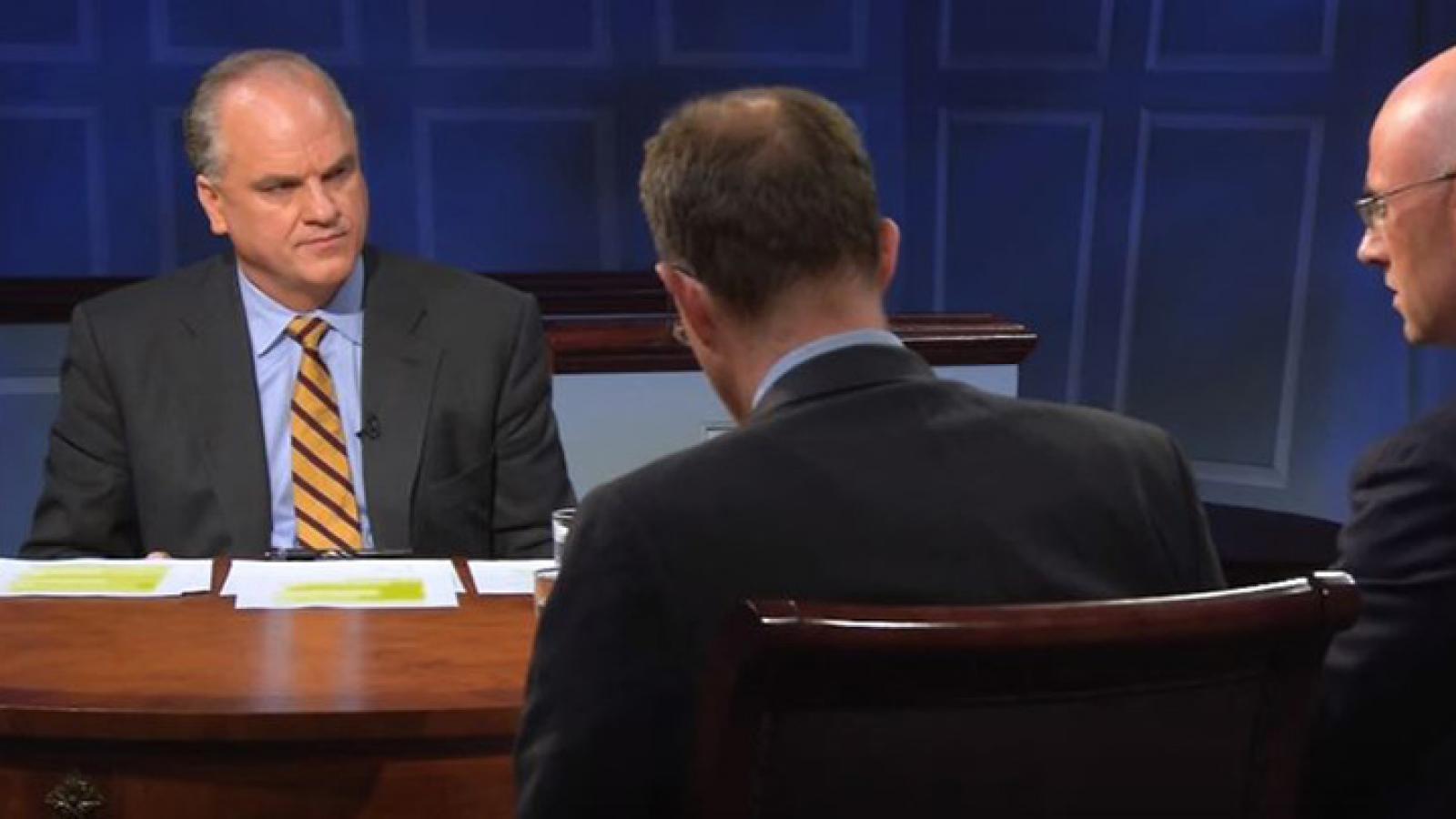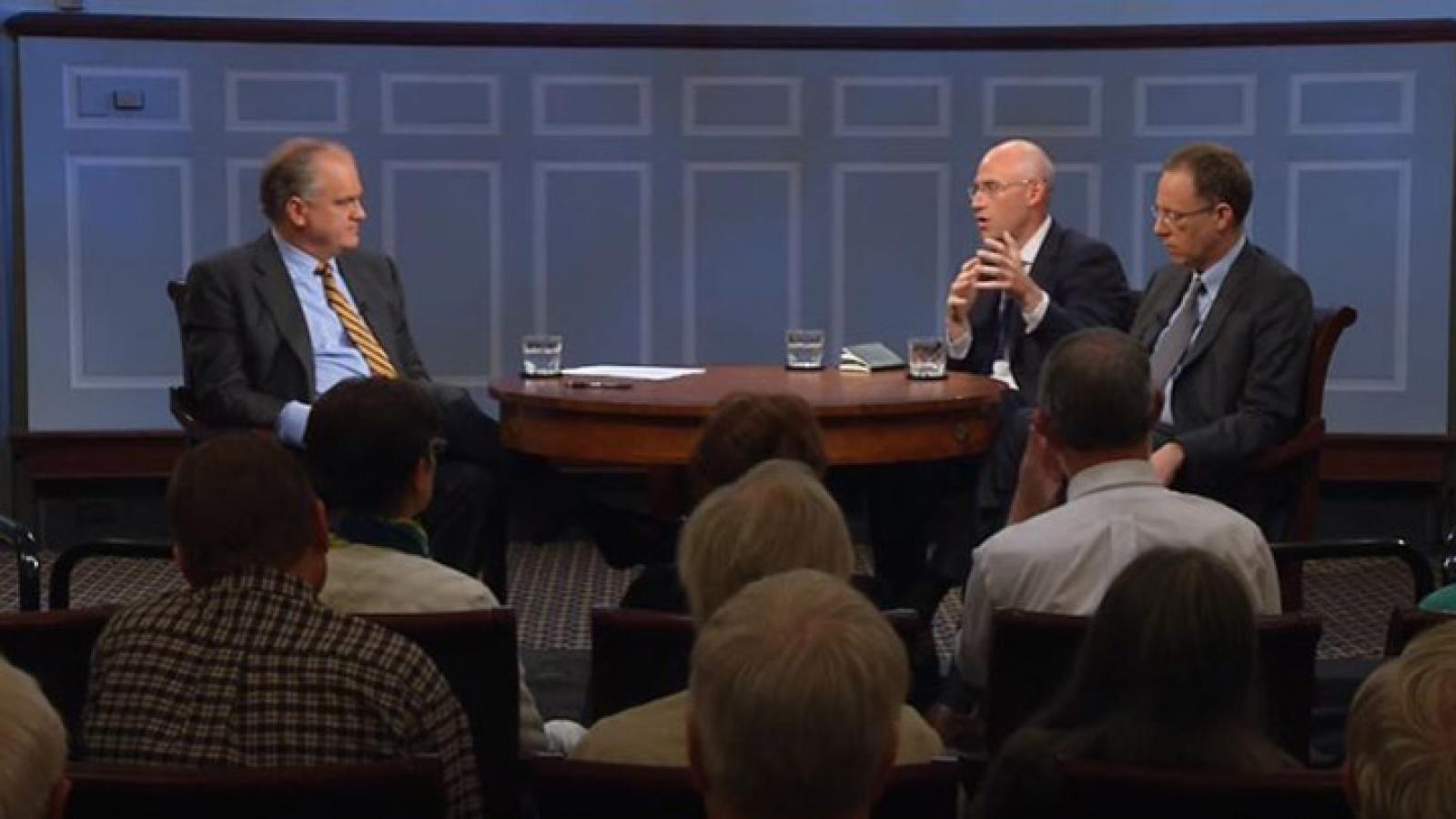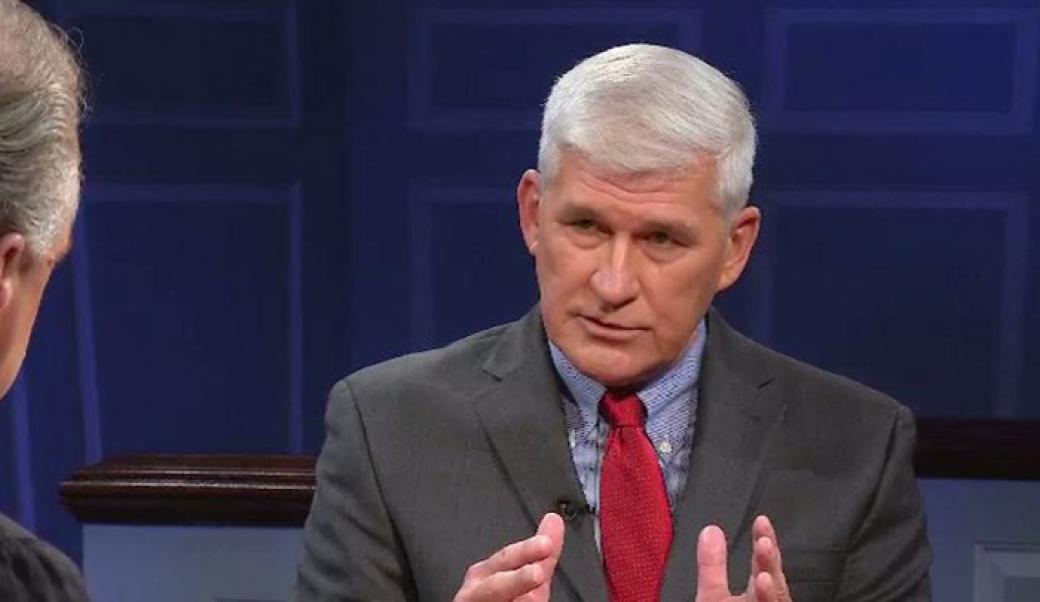About this episode
June 09, 2016
Greg Jaffe and Matthew Sherman
Matthew T. Sherman is a foreign affairs analyst and specialist who has served as a senior advisor to the State Department and the U.S. military. Mr. Sherman has been deployed to Afghanistan with the United States Department of Defense, serving as a senior civilian advisor to numerous operational and strategic commanders. Greg Jaffe is a Pulitzer Prize–winning Pentagon and national security reporter with the Washington Post, who recently wrote an article describing Sherman’s transition back to home after his long tour of duty. Greg is also a coauthor of "The Fourth Star: Four Generals and the Epic Struggle for the Future of the United States Army."
Transcript
0:51 Doug Blackmon: Welcome Back to American Forum. I’m Doug Blackmon. The United States has been fighting its enemies, and alternately trying to help its friends, in Afghanistan and Iraq for almost 15 years. Nearly 7,000 U.S. soldiers have died, along with vastly larger numbers of civilians and enemy fighters. Hundreds of thousands of Americans were injured in combat or in other, more subtle ways.
FACTOID: The Question: What has long U.S. war in mid-east achieved?
The financial cost of all this destruction, and then the re-construction we often attempted at the same time, are hard to pin down. But at least 1.6 trillion dollars has been spent. Not all of it went to guns and soldiers. Many millions funded efforts to make those countries politically more stable, more open to democracy, more tolerant of human rights and less vulnerable to the kind of extremism that has produced terror groups like al-Qaeda and, today, ISIS. In this episode, we continue our special series, “Aftermath of the Endless War,” this time looking at the conflict from the perspective of thousands of civilian employees hired by the U.S. government to advise our troops and their commanders, and to assist local and national leaders in rebuilding their countries. Joining us today is Matthew Sherman, who quit his job as an attorney in 2003 to, first, join the American governing authority in Iraq, and ended up spending 13 years working for the U.S. military both there and in Afghanistan—making him one of the very longest serving civilians in those two war zones. Also here is Greg Jaffe, a Pulitzer Prize-winning Pentagon and national security reporter with The Washington Post, who recently wrote an article describing Sherman’s transition back to home after his long tour of duty. Greg is also a co-author of the book, The Fourth Star: Four Generals and the Epic Struggle for the Future of the United States Army. Thank you both for being here.
Matt Sherman: Thanks for having us Doug.
Blackmon: So let’s just start with how you got into this Matt. It’s 2003, you’ve got a good job making a good living at a law firm and you decide to take a job like this that is going to take you to Iraq. Why did you do that?
Sherman: Well this wasn’t the career trajectory that I anticipated whatsoever. Um but it was something that at that time back in 2003 our country was just coming off the attacks of 9/11 in New York and Washington D.C. And I was enjoying my job as an attorney in New Jersey but um the call of service of national service international affairs which has really been my interest for many years, education with international relations. Um had me decide that I wanted to get involved and take some part. I just didn’t know that it would take this form or last this long.
Blackmon: And so the first job that you took, I mentioned in the introduction, was the governing, the American governing authority in Iraq, but what exactly was that and over the next couple of years how did that change? Give us a sense of what you did.
Sherman: Sure. The first work, the first position I had was as an advisor to the Iraqi ministry of the interior. And in that job I was able to engage with, this was only supposed to last six months, and it ended up lasting two years where I then engaged with an advised four different ministers of the interior that came and went with the various governments and elections that happened in that time. Um but it also allowed me to begin engaging a lot with the U.S. military because they had a very dominant role within that conflict. And so from that job I then eventually then transitioned to other positions um working with the U.S. military where as an advisor to the military commander in charge of Baghdad during the planning and implementation of the surge there in ’06 and ’07 and then I eventually transitioned to Afghanistan in 2009 again working at a tactical level, at brigade level, the battalion level um working with the State Department ah and dealing with local development umm governance and also some security matters. Then transitioning to working with subsequent generals who commanded the whole theater General McChrystal, General Petraeus. And then once I kinda got to knowing this whole, this whole institution in many ways umm I went back again and ah most recently in October of 2012 working with a whole series of commanders there. Um most recently General John Campbell and we concluded our tour in March of this past year.
5:27 Blackmon: So Greg what was the, when you decided to do a piece on ah the article that you wrote in The Washington Post about this tenure of Matt Sherman, now you call him, I think you call him one of the longest serving civilians or is he actually the longest serving civilian or is there any way to know?
Greg Jaffe: I don’t think there’s any way to know, I couldn’t find anyone longer so if anybody is out there this is your chance.
5:51 Blackmon: But so what was the reason to do that?
Jaffe: You know I would try and grab Matt when he was back in Washington for testimony or whatever to get a sort of azimuth check on what was going on and figure stuff out and in the course of having beers he mentioned that in 2003 he put all this stuff in this storage shed when he quit his law job and locked it up and that he had absolutely no idea what was in there. And I said you must have some idea. And he’d say I have no idea. And so I was like you know I got to be there when you open it up. I didn’t know what was in there but I thought it was some way of sort of telling the story of these last 13 years of how ignorant we were when we started and sort of what we’ve learned. I just thought there was some new way of telling a story that I felt like I told a dozen times over the last 13 years in that storage shed.
FACTOID: Go to Washingtonpost.com for Jaffe’s article on Matt Sherman
6:40 Blackmon: And when you guys opened up the shed, I mean and that is sort of the device for the, for the whole story, what did you find there?
Sherman: Umm, it was amazing to kind of look through you know magazines and articles and journal articles and books from that phase of my life. That was much earlier on and Greg saw that.
Jaffe: Yeah, yeah. We found everything. Food, cause if you’re only going to be gone six months why not save that can of peas apparently?
Sherman: I think that was kind of a low point I have to admit.
Jaffe: Right, Right, Matt had this notebook that he just a loose leaf notebook from his office and you know on one page there was some legal mumbo jumbo, some contract agreement. And then like on that same page and the next page he was trying to teach himself Arabic, you know, assam alaikum written out you know. And I thought oh my gosh this is going to be the key advisor to the administer to the interior and not that he didn’t do a good job with it he did you know he threw himself into it in a way that few wouldn’t have. Um but it just showed how little we know about this place we were invading. And Matt was not the exception I mean that was the entire U.S. government, the entire U.S. military. It was me covering it. I had no idea what I was covering.
7:54 Blackmon: And so at the beginning of that time when you first arrived there there’s been the initial military success and the toppling of Hussein and now the what do we do next phase beyond as that’s sort of what you drop in right into the thick of.But were you, what level of optimism did you have about what was going to happen in Iraq?
FACTOID: Hussein captured nine months after U.S. invasion executed in 2006
Sherman: Well I got I arrived in January 2004 so there was a lot of optimism there. But there was also a sense of get out as quickly as possible and to hand this off to the Iraqis in order to handle. And ah, ah, so there was ah you know we always looked at everything in terms of a six-month window. You know we’re going to transition this in six months and be able to get out. But there is always something that kind of came up or there wasn’t long range thinking that kind of thought beyond that. So again when I signed up um in December of 03 um I was signing up for a six-month assignment. That’s it. And at that time the CPA Coalition Provisional Authority was scheduled to conclude I believe in June of 2004 and that would be it. We’d go to a normal embassy presence and we’re done. And as we now know, that did not happen.
FACTOID: Coalition Provisional authority governed Iraq after Hussein’s fall
9:12 Blackmon: Let’s fast forward this story a little bit um so you have this pretty extended time in Iraq. You served for a bunch of different ministers. You see the, you see the intital chaos and unexpected uh results of the immediate aftermath then you see the success of the surge and we’ll circle back to some of that. But then you end up in Afghanistan. And in a somewhat different kind of role but and one of the things that’s talked a good bit about in the article that Greg wrote was your experience and a lot of other effort that went into a village called Baraki Barak. But just tell us about that place and what was significant about it.
FACTOID: 2007 ‘surge’ to quell Iraq uprising began with 30K more U.S. Troops
Sherman: Sure. Baraki Barak is a district in Logar Province that’s immediately south of Kabul. And Baraki Barak’s maybe 25, 30 miles immediately south of Kabul it’s at the mouth of this valley called Tangi Valley which is actually probably one of he most violent places in all of Afghanistan. But the brigade that I was embedded with at the time had this area within their thing called an AO, their area of operations. And so one of the main focus points was to be able to, at the time, COIN was the big initiative to be able to put a lot of resources personnel embedded within that part of the province in that part of the country in order to implement COIN and um that’s what we initially went about doing.
FACTOID: U.S./NATO used similar counter-insurgency strategy in Afghanistan
10:43 Blackmon: And COIN by the way just to be clear is sort of fits with the surge sort of it’s the, it’s the help with reconstruction, um, um, ah make it clear to the civilians that we’re here to protect you not to police you (Sherman: Right). Ah, we’re here to keep the insurgents from injuring you and bring resources to you domestic needs. I mean that’s what COIN is.
Sherman: Counterinsurgency where you’re you do security operations but you’re also at the same time building up their economy, building their local government, helping build their local governance, helping build their local security forces. So it’s a much more grassroots ah sort of effort. And that was the primary focus not only in Baraki Barak at the time but throughout much of the country as the Afghan surge was in the upswings. General McChrystal and General Petraus you know would be able to bring down dignitaries to be able to show you know this is a microcosim of what we’re trying to do at large and the success that we’re having. And in some ways that was very true. But also these sorts of issues are very difficult in order to prolong and embed and be able to be self sustainable. And ah what happened later on in 2013 I left Afghanistan for about nine months at that time but left one of the local elders was killed in the security operation and from there it kind of unfolded. That just in my mind underminded how again difficult these things are to sustain because you have rotations of U.S. or coalition forces coming in, coming out. Personalities are different. Intelligence isn’t always shared as much as possible. And if a few key people are injured or killed or dishonored then a lot of these things can just quickly unravel.
12:26 Blackmon: But in Baraki Barakat what were some of the specific things that happened? When it appeared to be going well, what were the markers of that success?
Stephens: Well what made Baraki Barakat helpful was it’s close proximity to Kabul. Was that it had a market right there. It had a local police force that was right there. It had a reasonably sized population. And so we were able to kind of use that as a base in order then project development projects operations, um and to be able to hopefully compound upon it. Not only in that district but throughout the rest of the provinces and such.
Jaffe: I think violence levels went way down there if I remember right. It was a place where the Taliban had a pretty good grip and it looked safe and it looked appealing and I passed through on a visit with Admiral Mullen at one point and we would you know all paraschute through there at one point or another. Like oh this looks pretty good.
FACTOID: Admiral Mike Mullen chaired joint chiefs to staff, 2007-2011
13:15 Blackmon: So it’s like a success story.
Jaffe: It did yea.
13:19 Blackmon: And you wrote in the piece though Greg there was a a military assessment, I think, that described same place as currently quote, “the center of mass for insurgents in the provences around the capital.” So basically now it’s a place the Taliban is back in control. And Matt you pointed out a second ago this sort of critical leader who had been friendly to the United States efforts there had been killed. So, so what does that say about the whole the whole process at large?
Jaffe: I think that it says that it’s really tough to sustain. It’s really tough to sort of, you can have little islands of success but for them to stay successful they’ve got to be connected back to Kabul. And in some ways that the, what we built in Kabul was so fragil.
FACTOID: Obama recommitted U.S. to Afghan war in February 2009
14:03 Blackmon: You know we had on the program a, a year or so ago ah General Dan Bolger and then Lieutenant Colonel Nagl, the guy who, John Nagl who co-authored the counterinsurgency manual of General Petraeus. And Nagl was saying in that episode his specific quote was that if the U.S. fumbled these wars on the one yard line after we carried the ball 99 yards and then fumbled on the one yard line, and that if we put in Afghanistan apresence of 50 thousand troops or 35 thousand troops and were willing to keep them there for imperpetuity that you would end up with a stable country and a stable democracy. Is that, what do you make of that sort of an analysis based on your experience?
Sherman: I see it a bit differently. I see Afghanistan in a much longer viewpoint than that. So the mission there has changed a bit. First, you know Afghanistan can potentially be a success but it’s in many way how we define success. Are we going to have Baraki Barakat in 2009 and 10 throughout the whole country? No we’re not going to be able to do that. But is it possible for the United States to have a partner in that part of the world um that’s been historically plagued by violent extremism regardless of its name, regardless if you call it al-Qaeda, if you call it the Taliban, if you call it [unintelligible]. And if you’re able to have a partner in there that’s able to work with you in order to address those key transnational threats, then that’s a very important thing to have. And while COIN itself may not have been successful, if you look at the broader national security interests that we have, we actually do have an opportunity there. In order to work with this government to work their security forces primarily so that you’re able to deal with these, these, these threats so they don’t threaten the homeland again. And that’s in my mind the important big picture that we have to remain focused on.
FACTOID: Afghan forces officially took over security from NATO in June 2013
16:02 Blackmon: And we did have in the past year, the there were setbacks. The Taliban gained a lot of ground. There were some major defeats but the Afghan military did not completely collapse as the Iraqi military did at one point. Um similar. And so is that the kind of moderate success that we should really be focused on?
Sherman: The U.S. technically ended combat operations at the end of 2014. So now legally we’re not doing combat operation and so as a result we transitioned all of that over to the Afghans.
FACTOID: Obama announced drawdown of troops in Afghanistan in May 2014
Now as a result, there have been massive shifts and transitions that have been going on and there has been back and forths where the Taliban and the Afghan government has been, been really battling over some key terraine. But what’s important to always remember is that while there have been some sort of losses, at least the Afghanistans have actually also been able to retake lost territory as opposed to certain things that we’ve seen in Iraq or Mosul. Mosul fell I believe in June of 2014 and it is still under control of ISIS or Daesh. That’s not the case in Afghanistan. And that’s an important distinction to have. When people say Afghanistan is going the way of Iraq at least the Afghans are able to come back and fight and be able to retake these important areas.
Jaffe: I would say one thing having ten thousand troops there allows us to help them do that. I think if we didn’t have those ten thousand troops I’d be pretty suspicious about whether they would be able to take some of the lost territory for example in Kunduz where they were able to fight and take that territory. Whether that would actually happen.
Sherman: If they didn’t, Kunduz was an area in northern Afghanistan that fell under Taliban control for a few days in October of 2015. And a few days later it was taken by the Afghans. And had that not happened with our support we certainly helped them considerably. Then you’d be in a much more strategic environment where you literally see Afghanistan more on par with where Iraq is right now.
18:10 Blackmon: One of the poignant small details that was in the story that was mentioned was that one, you saw a friend shot by a sniper while you were in Iraq and then you began making, keeping notes in a journal when you went to memorial services for American servicemen and others in both places. And ultimately you went to 187 memorial services. Are we specifically engaged enough on this for you to feel like sacrifices that you and lots of other people made were worth it?
Sherman: Maybe. I think a lot of people perhaps just don’t understand. Now again I’ve been overseas in Iraq and these two wars for many many years so I have a different perspective on this. Um but I think in many ways you know the country is moved on to to whatever the issue is of the day as opposed to deeper more substantive foreign policy issues. Now they’re more focused on what they’re twitter account says you know about the Kardashians or Trump or whatever the things are and that’s in many ways unfortunate because the issues that we’re dealing with not only in Iraq and Afghanistan but elsewhere deserve substantive discussion. They deserve substantive debate disagreement. Um and we seem to have lost that and that’s unfortunate. And um you know if anything, I try to always stay away from whether Iraq is the right war or the wrong war. Afghanistan is the right war or the wrong war. What’s so important to me is honoring those who sacrificed um the soldiers, the marines, sailors, civilians and that’s what drives me a lot and why I stayed involved in these things for so long and why I went to so many memorials. Because memorials I would just um stand inside and it would be in many ways just a quiet moment of reflection for me of, of in many ways reaffirm my own sort of commitment to this. And, and that it’s also bigger than any one individual and that’s the sort of way I look at it.
FACTOID: U.S. casualties exceed 6,880 in Iraq and Afghanistan conflicts
Jaffe: The downrange memorial services too, they’re really personal and interesting if you haven’t seen one before. You know it’s usually a little combat outpost. There’s always a buddy’s speech. The dead soldier’s best friend gets up and delivers a short three to five minute very emotional um very honest kind of eulogy to the guy you know ridden in this little combat outpost you know usually you know less than a half a mile from where the, the incident happened. Then there’s a roll call in which the first sergeant of the company reads out the roll of all the names and the soldier who’s died doesn’t answer. It’s just a really striking moving moment.
FACTOID: See millercenter.org for more Aftermath of Endless War
20:55 Blackmon: A student suggested that I ask you ah, if you were giving advice today to the you before your 13 years of this whole, ah tour of duty, what would the advice be that you would give yourself 13 years ago?
Sherman: Geez, um, never stop learning. Never stop questioning your own preconceived notions. I mean we’re all defined by our experiences and things like that. But just given this sort of job, and it can be applicable to many other jobs, you always want to in many ways challenge yourself and not become complacent. And that was acutely so with this job because it was such a fluid and dynamic sort of environment. But just in general be, always, always rely on your knowledge and background but not necessarily be defined and narrowed by it. And that’s what I would recommend.
21:56 Blackmon: We’ve got a project here at the Miller Center called “First Year” in which we ask almost everybody who comes on this program and many other means, ah about advice for the new president particularly focused in their first year of their presidency. I want to ask both of you about that. Let’s start with Greg. But, but, I know you’re a journalist but and so you’re not in the business of advising presidents. If you had the opportunity to say just you know Mr. or Ms. New President, here’s just a couple things that I think would be worthwhile for you to think about from the seat that I have held over the last 15 years, what would those be?
Jaffe: I would encourage them to really press your military and the, your institution to do an exhaustive study of what happened. Of what we learned and what worked and what didn’t work. I still think we just don’t know enough about what we did The one thing I would encourage to the President is before you move forward really force your institutions to look back because I don’t think we’ve digested what’s happened to us.
FACTOID: Less than one percent of Americans in military now, over 12 percent in World War II
22:53 Blackmon: Matt, last question same for you.
Sherman: I think that’s an important one. [unintelligible] given the amount of time and money and resources have built, have put in towards building these security forces a lot of times we don’t necessarily how they’re politically manipulated back by the host government for a whole host of various reasons by those who are in power. Um, and then lots of times we try to build them in our own image in some ways. I know consciously they don’t think they’re doing it but in many ways it does happen. Um, militarizing the police forces and things like that um but it also goes to you know, the army is in the midst of a real transition scaling down a little bit. And while resources are important to some degree, it’s not about just kind of throwing more money at our problem, it’s about doing it more smartly. And I think that particularly goes with regards to the security forces that we will, I agree with Greg, we will kind of continuously build or reform for many years but much more smartly. And it doesn’t necessarily mean you have to build a security force of 200,000 or 300,000 or larger, it means you have to really tailor it to the certain sort of environment that they’re in because mass doesn’t always matter. And sometimes that mass can be used against your wider efforts and be a source of instability within the country as we’ve seen particularly right now in Iraq.
Jaffe: We’re always in such a rush. And it’s something in our DNA I think as well as Americans.
Sherman: Yeah. And it’s compounded by your going to be doing a one-year tour and so you feel like you want to accomplish something. And this is why, you know, I think it’s important to look at these sort of conflicts for a longer term. And I know people don’t like to hear that particularly because we’ve been there for so many years. But that’s the way that these sort of issues need to be addressed and then followed through on it, that’s just very difficult given how our bureaucracy, not only military, but how our bureaucracy writ large is structured.
Jaffe: My favorite coffee cup from these forces is one that says “We were winning when I left.” It was the typical one.
24:54 Blackmon: Matt Sherman, Greg Jaffe thank you both for being here. Thanks for all that you’ve done over this long period of time.
Sherman: Thank you Doug.
Blackmon: We hope you’ll continue this conversation wherever you are with your friends, your coworkers, the people at church whomever. That’s what American Forum is about. Informed dialogue with engaged citizens like Matt Sherman who believe in our democracy even when it’s imperfect. If you would like to discuss anything with us here at American Forum read a transcript or watch other episodes go to the Miller Center Facebook page, visit us at millercenter.org/americanforum or follow us on Twitter @douglasblackmon or @americanforumTV. I’m Doug Blackmon. See you next week.
